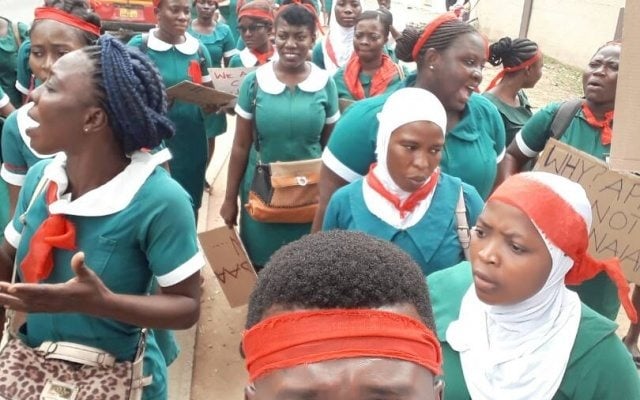The Ghana Registered Nurses and Midwives Association (GRNMA) has temporarily suspended its nationwide strike, offering a reprieve to the strained healthcare system and a window for renewed negotiations with the government. The decision, announced by GRNMA President Perpetual Ofori-Ampofo, followed a high-level meeting with Parliament’s Select Committee on Health, signaling a potential breakthrough in the impasse over delayed implementation of the nurses’ and midwives’ revised Conditions of Service. The strike, initiated earlier in the week, disrupted healthcare services across the country and highlighted the growing tension between the association and the Ministry of Health. While the suspension offers a temporary respite, the underlying issues remain unresolved, and the GRNMA has made it clear that their willingness to negotiate is contingent upon the government’s demonstrable commitment to addressing their concerns.
The crux of the dispute lies in the government’s failure to implement the Collective Agreement signed with the GRNMA in May 2024. This agreement outlined revised Conditions of Service, encompassing crucial aspects of their professional lives, including salary adjustments, benefits, and working conditions. The GRNMA contends that the ongoing delays in implementing these agreed-upon changes represent a breach of trust and a disregard for the vital role nurses and midwives play in the healthcare system. The association’s decision to resort to industrial action underscores the depth of their frustration and the perceived lack of seriousness on the government’s part in addressing their concerns. The suspension of the strike provides an opportunity for both parties to return to the negotiating table and work towards a mutually acceptable resolution.
The suspension of the strike signifies a strategic move by the GRNMA, demonstrating their willingness to engage in constructive dialogue while simultaneously applying pressure on the government to act decisively. By temporarily halting the strike, the association aims to create space for meaningful negotiations, emphasizing its commitment to finding a lasting solution that benefits both its members and the Ghanaian public. However, the suspension comes with a clear caveat: the government must demonstrate tangible progress in addressing the GRNMA’s concerns. This temporary reprieve should not be interpreted as a relinquishing of their demands, but rather a calculated step to facilitate dialogue and pave the way for the implementation of the agreed-upon Conditions of Service.
Mrs. Ofori-Ampofo’s statement during the press conference underscored the association’s resolve and served as a stark reminder to the government of the potential consequences of inaction. Her words, “This should serve as a wake-up call… We are open to dialogue, but we will not hesitate to take further action if our concerns continue to be ignored,” clearly articulate the GRNMA’s position. The association is willing to work collaboratively towards a resolution, but their patience is wearing thin. The onus is now on the government to demonstrate good faith by engaging in meaningful negotiations and taking concrete steps towards implementing the revised Conditions of Service. Failure to do so could lead to the resumption of the strike, with potentially more severe consequences for the healthcare sector.
The GRNMA’s decision to suspend the strike has been welcomed by stakeholders concerned about the impact of prolonged industrial action on the healthcare system. The return of nurses and midwives to their posts will alleviate the strain on hospitals and clinics, ensuring that essential healthcare services can continue to be provided to the Ghanaian population. However, the underlying issues remain unresolved, and the temporary nature of the suspension means that the threat of further disruption looms large. The coming days and weeks will be crucial in determining whether the government and the GRNMA can reach a lasting agreement that addresses the concerns of the healthcare professionals and safeguards the well-being of the public.
The situation underscores the critical role of nurses and midwives in the healthcare ecosystem and highlights the importance of addressing their concerns to ensure a stable and functioning health system. The government’s response to the GRNMA’s demands will be closely scrutinized, not only by healthcare professionals but also by the wider public. The successful resolution of this dispute will require a commitment from both parties to engage in good-faith negotiations and find a sustainable solution that respects the vital contributions of nurses and midwives while ensuring the continued delivery of quality healthcare services to the people of Ghana. The GRNMA has extended an olive branch, and the government must now reciprocate with concrete action to prevent further disruption and build a stronger, more resilient healthcare system.


